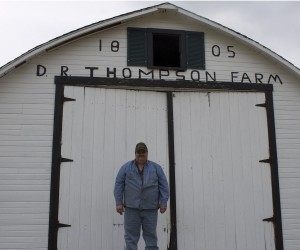NEW WILMINGTON, Pa. — A farm with roots 200 years deep clings to what it is and what it was before a road divided it in the 1970s.
The Thompson Hill Farm in Lawrence County was recently named a bicentennial farm by the Pennsylvania Department of Agriculture.
Thompson Hill Farm is nestled on a back road near New Wilmington, surrounded by Amish farms. Now approximately 120 acres, the farm encompassed more than 1,400 acres when it was purchased in 1805.
Seventh generation
The family’s seventh generation, Dale Thompson, now lives on the farm, and raises soybeans, corn and hay.
The farm was originally purchased on a land grant from the U.S. government. George Thompson settled on the property in 1805 after building a log cabin. He drove a supply wagon between what is now Pittsburgh and Cleveland, and settled in this area because it was halfway between the two.
The first Thompson planted an orchard and cleared the land to begin farming.
Although the buildings from the original farm are not visible, the foundations of an old farmhouse, corn crib, barn and the former chicken coop are still there.
Passing it down

When George Thompson died, his son, George T. Thompson took over and had 12 children, and the farm has been passed down from one generation to another, although various parcels were sold over the years.
In 1912, the original farm was deeded to Arthur Kirk Thompson (Dale Thompson’s grandfather). He graduated from Westminster College in 1908 and took graduate work at Penn State and the University of Pittsburgh, and became a teacher at the Hickory High School. He married Agnes M. Weber in August 1909.
Eventually, he became supervising principal at Ellwood City and served there until his death in 1929.
Arthur Kirk Thompson continued to purchase parcels of land that had belonged to the family farm, trying to return it to what it once had been. His family was the last generation to live in the original farmhouse, which was destroyed by fire.
Dale Thompson shares the family story that there were no fences on the farm when his grandfather owned it, and the children of Arthur Kirk Thompson used to take turns taking the cows to a field and staying with them until it was time to bring them back to milk them.
History
In 1959, the farm was deeded to Francis Robert Thompson, who had married Betty Lou Gertner in 1941. They had five children.
When Francis was owner of the property, he had the farm qualified to come a century farm. At that time, there were 175 acres in the farm.
Soon after that, state Route 60 or what is now 376 cut through the property, taking about 40 acres of the lower end of the farm. Because of the loss of property, Thompson sold his 50-head herd of Holsteins and concentrated on raising cash grain crops.
Today, the farm remains productive in soybeans, corn and hay. However, now that the four-lane freeway splits the property, Dale Thompson explained, it is seven miles to go from the home to the farmland on the other side of 376 and back.
“Once the machinery is down there — it stays there until it is finished,” Thompson said.
In addition to farming, both Dale Thompson and his father drove truck for off-the-farm jobs.
Now, Thompson concentrates on his farm — he says he never wanted to do anything else with his life but farm.
“It’s what I grew up with and what I love,” Thompson said.
Staying in the family. He said the Thompson family is proud to be farming 200 years after it was started.
“It’s in the Thompson family; it is staying there,” he said.
Thompson has three sisters and he plans on passing the farm down to a niece or nephew when the time comes for the next generation.









